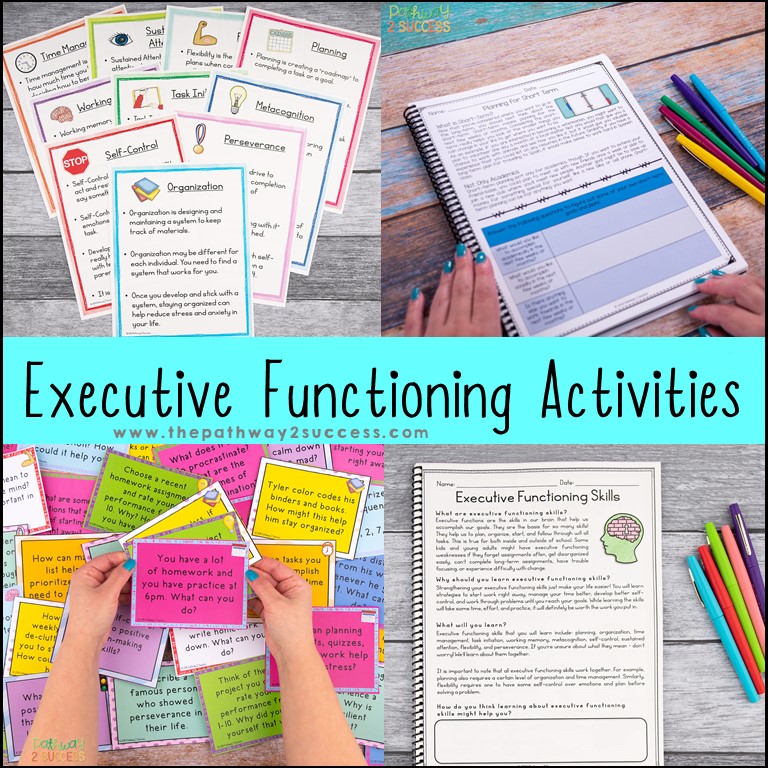
Students with executive functioning challenges may also struggle with managing their emotions and maintaining appropriate behavior in the classroom. This is because the umbrella of executive functioning also includes skills for self-control, flexibility, and perseverance. Additionally, some students may not fully understand the classroom expectations to be able to follow them through.
In order to provide assistance to these kids and teens, there are a number of accommodations and supports we can put in place. As always, the goal with accommodations is to help level the playing field so students can think, learn, grow, and succeed in the way that is best for them.
Below are some accommodations to support with emotions and behavior.

Accommodations for Emotions & Behavior
Behavior Intervention Plan. Create a formal plan for an individual student that details the child’s challenging behaviors and specific strategies to work through them. Making a written plan is helpful in keeping all educators on the same page.
Daily Emotions Check-In. Use a daily emotions check-in to help students understand how they are feeling and what they might need for the day. Give this free emotions check-in a try or use this executive functioning daily check-in to provide an emotions check-in with EF skills combined in one.
Visuals. Provide visuals with reminders about academic and social expectations in the classroom.
Calm Down Space. Design a calm-down area in the classroom. Add appropriate tools to help build self-regulation skills, such as coloring activities, fidgets, mindful breathing cards, books, and journal writing activities.
Predictable Routine. Arrange a highly consistent and predictable routine each day using a schedule.
Post Clear Expectations. Clearly post visual and written expectations in the classroom. These can be posted around the room and/or directly on the student’s desk, if needed. A note that expectations should be written in the positive form (Raise hand to ask question vs. Don’t shout out).
Provide Coping Skills List. Design a specific list with options for cool-down techniques the student can use.
Track Goals. Develop SMART goals together and track them on a weekly basis.
Use De-Escalation Strategies. Use calm-down techniques to de-escalate a situation when a child is upset or overwhelmed. While de-escalation strategies are also a good teaching practice, it may be helpful to document them as part of a student’s individual accommodations and supports. Use this free list of de-escalation strategies for ideas to use in the classroom.
Weekly Check-In with Counselor. Plan a weekly check-in time with the school counselor (or other support professional) to give extra organization and planning support. This adult could also become a coach for working through challenges throughout the week.
Teach Positive Self-Talk. Encouraging words can go a long way to working through challenges. Use positive self-talk and affirmations to build confidence and find success.
Home-School Communication Log. Create a space to share messages back and forth with families on an on-going basis.
Provide breaks. Use movement, mindfulness, and other activities to give meaningful breaks throughout the day.
Daily Feedback. Give feedback in an end-of-the-day reflection. This can help students build self-awareness and improve confidence. Use these free reflection questions to start.
Social Skills Group. Lead a small social skills group to teach social skills necessary for personal and social success. A group could be taught by a special educator, school counselor, social worker, or school psychologist. Some skills targeted might include active listening, turn-taking, perspective-taking, flexibility, self-advocacy, and problem-solving.
Daily Check-In and Check-Out. Plan for a quick 5 to 10-minute check-in with a trusted adult each morning and afternoon. In the morning, the adult can ask how the student is doing, review the daily schedule, and assist the student in getting organized for the day. In the afternoon, the student can use that time to review how the day went, discuss homework expectations, and make sure they have what they need to head home.
Teaching Executive Functioning Strategies
Accommodations and supports are important, but it is also critical to make time to teach students about their executive functioning skills and strategies they can use. Use this yearlong set of Executive Functioning Lessons and Activities to teach about how to plan, stay organized, manage your time, and more.

A final thought is to be flexible with accommodations for struggling learners. Not every strategy and support is going to work perfectly. If something isn’t helping the child be successful, head back to this list and give a new accommodation a try.








Pathway 2 Success has been a life saver. It is the most comprehensive and quality site that I have used to meet my students’ needs. Thanks so much.